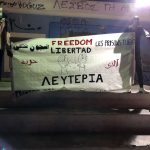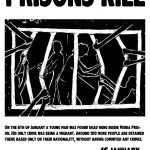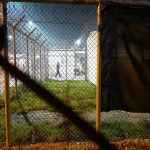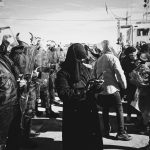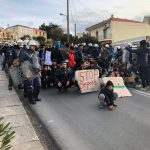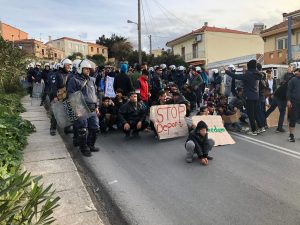 The limits of this island have become tighter for everyone. More than 21,000 people are settled around Moria, trapped in Lesvos. The awful conditions affect everyone. From the beginning of this year new Greek migration law was implemented, making the lives of people much more difficult, making it much easier to issue negative asylum decisions and to increase deportations. Social polarization is rising. Extreme-right ideology has found space among a section of local society. People inside Moria camp are trying to react. Likewise they face similar problems of racism and hierarchy that prevent the unity of their struggle. Racism is everywhere. Locals are against migrants, Afghans against Africans, Greeks against foreigners. In a very short period, between 16th January and 9th February, we saw several reactions.
The limits of this island have become tighter for everyone. More than 21,000 people are settled around Moria, trapped in Lesvos. The awful conditions affect everyone. From the beginning of this year new Greek migration law was implemented, making the lives of people much more difficult, making it much easier to issue negative asylum decisions and to increase deportations. Social polarization is rising. Extreme-right ideology has found space among a section of local society. People inside Moria camp are trying to react. Likewise they face similar problems of racism and hierarchy that prevent the unity of their struggle. Racism is everywhere. Locals are against migrants, Afghans against Africans, Greeks against foreigners. In a very short period, between 16th January and 9th February, we saw several reactions.
16th January – “Prisons Kill” demonstration
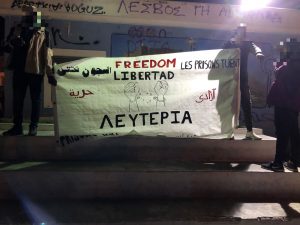
Prisons kill demonstration, 16th January 2020
On 6th January a young man was found dead, hanged inside Moria prison (PRO.KE.K.A.). Around 100 more people are detained there based only on their nationality, without having committed any crime. Ex-prisoners, solidarity activists and others from Moria camp protested the death in Mytilene. Around 300 people shouted slogans, distributed leaflets in many languages and walked the main streets of Mytilene centre. The demonstration called for an independent investigation into the circumstances surrounding the death, the closure of PRO.KE.KA. prison, and the immediate release of all those detained. They demanded that the struggle continue until Moria camp is demolished and all inside are free.
17th January – Demonstration in Moria camp
The same day a young man fell down dead after being stabbed outside Moria camp. Two days before another man from Africa, who was in a critical situation after a fight in Moria camp, died in hospital. Hospitals do not accept blood donations from migrants, and so there was a lack of blood available. The camp population had almost tripled since New Democracy took power, forcing people to live in a place without any protection, in which violence and exploitation escalates, establishing the ground for criminal structures. Tension between the communities was the result of mafia groups promoting racist discrimination. The next day, on 17th January, people from Africa and other regions organized a demonstration against the system of violence controlling Moria camp in order to inform people about the situation that they are facing. The demonstration was peaceful. People were singing and chanting slogans. Police attacked, randomly arresting three Somali men, another link in the chain of arbitrary arrests of migrant – especially black – protesters. They were detained and some days later a preliminary court hearing decided to they should not be held in pre-trial detention. Despite the decision of the court the three people were held in administrative detention inside Moria prison. One of them remains in prison and will be held until the end of the trial on 27th February.
22nd January – The local reaction
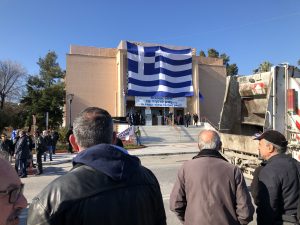
Municipality strike, 22nd January 2020
On 22nd January, local authorities called for a demonstration in Lesvos. Local people felt deceived and isolated by the EU and the Greek state. The new authorities had promised them that the island would go back to normality, but the migrant population increased within 6 months from 7,000 to 21,000. Posters were all over the streets in Mytilene proclaiming the motto: “we want our island back, we want our lives back”. All the elected parties and many organizations supported the call, sometimes with different slogans. A strike was ordered by the Chamber of Commerce, which blackmailed all businesses into joining. In the days leading up to the strike, the atmosphere was tense. NGOs issued warnings to migrants asking them not to go on the streets, for fear of attack. The message spread by the strike reinforced social division and polarized Mytilene. The demonstration was massive but peaceful, and the people gathered were a typical representation of Greek society. But the demonstration laid the foundations for extreme-right groups to spread their own message. The Free Citizens bloc of the Municipal government, a group associated with the 22 April 2018 pogrom, hung a banner outside the theatre declaring “Lesvos land of the Greeks”. Some among the authorities read hate speeches and a small number of young fascists looked for an opportunity to fight with migrants. Yet despite huge pressure to unite behind the Right’s message, there was some resistance. A group of doctors declared “We won’t participate in demonstrations of hate”, while students’ councils rejected a call from the Vice Regional Governor to participate in the mobilization.
30th January – Women Demonstration
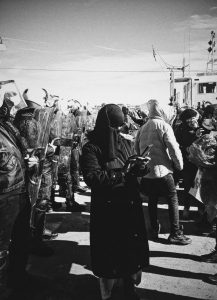
Migrant women’s demonstration, 30th January 2020
Just over a week later, on 30th January, around 300 migrant women mobilized and marched through Mytilene in a historic demonstration. They gathered outside the Municipal Theatre with their sons and daughters, sisters and mothers, to demand freedom, the end of imprisonment and the end of being treated as inhuman. Their banners were written in Farsi, French, English, Arabic and Somali, displaying female unity in the face of the violence of Moria camp. Yet the rightwing press and the police refused to believe the women could organize themselves, and saw the internationalism of their message as a sign that the international solidarity movement had orchestrated events. Police rounded up European women at the demonstration and took them to Mytilene police station for questioning and ID checks. In the following days, the rightwing press asked who had taught the women to write their banners in English.
3rd February – Massive migrant’s demonstration is trying to reach Mytilene
The momentum from the women’s march carried forward into a mass demonstration the following Monday. Posters in Moria declared a march from the camp towards Mytilene, demanding an end to inhuman camp conditions and protesting increased deportations, which were now targeting families. The Open Assembly of People With and Without Papers began meeting after the deadly September 2019 fire. Since then, in Moria camp, the urge to protest has grown. Yet protest has been silenced. Many demonstrations were hidden from view, blocked by riot police at the camp gates; police misinformation campaigns extinguished many more before they could happen, by telling potential demonstrators that they would be deported. The notorious history of prosecution against migrant protestors in Lesvos was another deterrent against resistance.

October 2019 migrant protest against deadly conditions in Moria camp blocked by riot police
On 3rd February, the population of Moria was no longer intimidated – if the punishment for protest was arrest and deportation, it was no worse than living quietly in fear, only to be deported anyway. Around 2,000 men, women and children marched from Moria camp to Mytilene. The demonstration was mostly made up of Afghans and Arabs. People from African states did not attend due to the power dynamics of the camp, in which they have faced racism. Helicopters hovered over the scene and police blocked their way around Kara Tepe camp, rounding up at least 22 migrants and European solidarity activists and taking them to the police station. While police would later use images in the media of burning tyres to justify their clampdown, protesters burned tyres in order to reduce the effect of tear gas attacks.
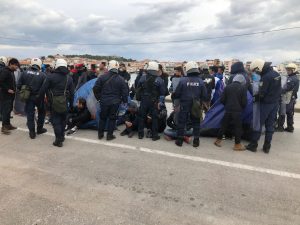
200 migrant protesters reach Mytilene, 3rd February 2020
A group of around 200 protesters outmaneuvered the blockade and took mountain trails to reach Mytilene, where they gathered outside the Municipal Theatre. Police attempted to surround the group and limit them to the pavement, but the group moved onto the road. The police presence was huge, with many special-forces units outnumbering the number of demonstrators. Some hostile local people made aggressive comments toward the group, saying they should be ‘thrown into the sea’. As police appeared to prepare for mass arrests, the group began to march back towards Moria camp. On their way, they tried to pass through Moria village, the most direct route back to the camp, where both villagers and police aggressively blockaded the road and forced the march to turn back.
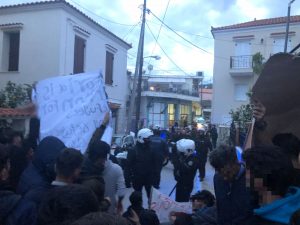
Local people and police block migrant protest at Moria village, 3rd February 2020
In the same evening the Regional Governor Kostas Moutzouris went to the area to listen to villagers, who expressed their anger. That evening the houses and offices of NGO workers were attacked. A band of masked men patrolled the streets and a van carrying migrants and NGO workers was stopped and stoned.
4th February – Migrants demonstration, police brutality, fascist patrols and antifascist reaction
The next day 200 people from Moria camp returned to the centre of Mytilene. This time police did not allow them to protest, breaking up an attempted road block with much more aggression than the previous day. Again, Europeans were taken to the police station and questioned. An Afghan woman fainted and some Greek people tried to push her in the sea. Some Italian journalists filming the scene were attacked by hostile locals. A Greek woman known to be in the solidarity movement was chased down the street by a group of far-right assailants, and threatened with what she believes was a knife. Witnesses state later that police rejected attempts to report far-right violence at the station. Police chased the demonstrators down the town’s main shopping street and out of town.
That evening locals blocked the road into Moria village with the complicity of the police. A Moroccan Italian woman was attacked in her car, and attackers attempted to beat her. During this time, police were present a few feet away but they reportedly turned a blind eye to attacks that took place during this time. After this a huge assembly took place in immediate response. The same evening a group of antifascists marched in order to take back the streets, shouting slogans such as “Azadi, Λευτεριά, for all detained”, “Lesvos is an antifascist land”, “No Nation, No Border, Fight Law and Order”, “With migrants we fight together, push back Nazis and police”. At Kara Tepe, police formed a road block preventing the group from marching forwards. On the way back the banner of the extreme-right Free Citizens Party, hung outside the theatre by locals on the 22 January demonstration, was taken down. Around 40-50 fascists were waiting for the demonstration to arrive back at Epano Scala in Mytilene. Discouraged by the big number of antifascists, the group scattered into the streets and patrolled Mytilene. Fascists armed with sticks and rocks picked off a small group of people in the streets, chasing them into Palia Agora, where they attempted to force their way into the bar.
5-9th February – the State and NGOs attempt to restore order
The next day, police officers raided One Happy Family, a community centre based between Moria camp and Kara Tepe. They checked volunteers ID cards with the intention of finding the conspirators behind the Moria demonstrations. The same day, an investigation was launched into 7 people from Moria village for illegal use of weapons. Although police witnessed far-right attacks as they happened, they failed to intervene until the following day. At the UNHCR’s monthly Inter-Agency meeting, where representatives of organizations and NGOs gather, UNHCR told NGOs to attempt to calm the leaders of the demonstrations.
Police also announced that they had identified 14 people from Afghanistan and Iran responsible for the demonstration of 3rd February, and that they had opened an investigation into violence, disturbance of the peace, property damage and other charges used to clamp down on migrant protest in Lesvos. Those arrests remind us of random arrests of the Moria 35 after a demonstration in the camp. Finally, up to now vigilante checkpoints are in operation around Moria village, with the complicity of the police.
Conclusion
In previous years people who were detained in Lesvos were demanding their right to move on. Now, people demand the right to exist. The meaning of the word “Freedom” is becoming broader. Unfortunately inside Moria camp populations are against each other. Discrimination and violence have become a way to find a better position in this living hell.
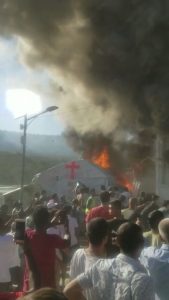
Fatal fire in Moria camp, September 2019
Europe and the Greek state send massive police forces, turning the island into a prison, sending the message that there is no alternative than to obey. The policies of the police, prosecuting migrants and solidarity activists for participating in protests, add fuel to far-right conspiracy theories that migrants and their allies are up to no good.
Local people have a feeling of abandonment from Athens and Europe. A section of local society accuses migrants instead of accusing the EU and the nation states responsible. Local people in Moria feel that their village is associated with the very worst. Some NGOs have contributed to this by playing into the imagery of disaster. With the arrival of the NGOs a new class appeared on the island. The business of professional humanitarians is transferred to wherever their financiers expand oppression, poverty and despair. We share the anger of the local people at NGOs. They are part of the problem. But if there is a dragon in this tale, it is the state and the interests of capital. NGOs don’t want to change this situation structurally; they just try to manage it.
After 2015, social contact was lost between Greeks and migrants. The state attacked self-organized structures. Only professional NGOs were allowed to operate inside the camps, allowing Europe and the Greek government to maintain their control. Solidarity, for them, is a product to be sold and consumed. On the other hand, we, the people of the struggle from any region of this world, with the power of our diversity, are trying to create links between oppressed people. Our weapons are the common struggles, the assemblies, the demonstrations, active solidarity, our speech, and our action. We welcome the struggle of our comrades in Athens, Thessaloniki and whole world. We welcome the occupation of the Greek consulate in Venice. We call for a march on 22nd February for a world without borders. We fight for a world of equality, free of racism and with respect for diversity.
facebook.com/VoicesofFreedomOpenAssembly

